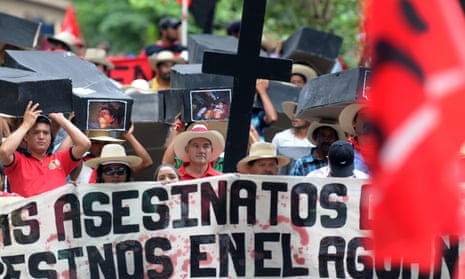Two more land rights activists in Honduras have been murdered amid a continuing wave of violence against community leaders opposing big business interests.
Jose Ángel Flores and Silmer Dionicio George – both members of the Unified Peasant Movement (MUCA) – were shot dead by a group of men outside the organization’s office in Tacoa, in the Bajo Aguán region.
A killing spree triggered by the 2009 coup d’état has made Honduras the world’s most dangerous country for environmental and land activists, leaving at least 120 dead, according to the NGO Global Witness.
The murder of indigenous activist Berta Cáceres in March triggered international condemnation, but the outrage has failed to stem the violence.
“Honduras has become a ‘no-go area’ for anyone who dares raise their voice for the protection of the environment,” said Erika Guevara-Rosas, director for the Americas of Amnesty International.
In the fertile Bajo Aguán, land conflicts have fueled a dirty war in which almost 150 peasant farmers and their supporters have been murdered since the coup, mainly by paramilitary groups.
The Bajo Aguán dispute dates back 20 years, to a World Bank-funded land modernisation programme. The farmers say thousands of hectares of land used for subsistence farming were fraudulently transferred to agribusinesses that grow African palms, which are exported to the west for biofuel.
MUCA was formed to try and reclaim the land through both legal action and illegal land occupations.
Former president Manual Zelaya launched an investigation to resolve the conflicts, but this ended when he was toppled in a coup backed by the business, political, military and church elites. After that, the region was heavily militarized, violence soared and drug traffickers moved in.
In May 2014, the Inter American Commission for Human Rights (IACHR) ordered the Honduran government to provide protective measures to Flores and George, along with 121 other campesinos in the Bajo Aguán.
Flores had been repeatedly threatened by a local paramilitary group which tried to destroy MUCA by using infiltrators and violence to impose a new leadership.
In April 2015, Flores survived an assassination attempt when a gunman’s weapon misfired.
Annie Bird, director of Rights and Ecology which investigates violence in the country, said: “These murders are a direct result of development policies being promoted in the region. Corrupt businessmen with military backing are funding paramilitary groups to consolidate control over the development agenda, by killing leaders and destroying movements which oppose multinational financed mega projects that are not in their community’s interests.”
